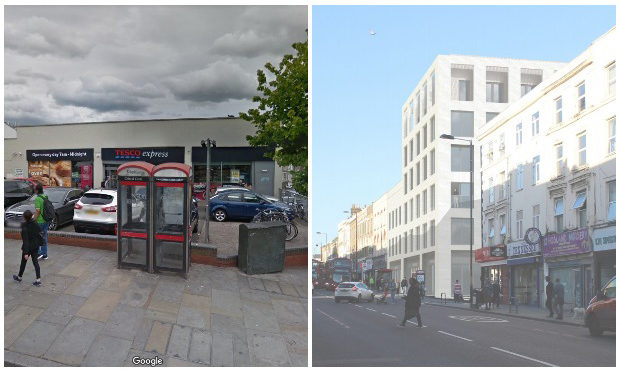Hotel on site of former Tesco pledges to work with local community

A Dalston hotel which sparked concern amongst residents over the potential impact of its bar on the area has pledged to “support local residents and businesses”.
The Rio Cross Residents Association (RCRA) said its members received a “horrible shock” when they found out that the hotel would include a licensed premises, pointing to plans advertising the ground floor as a ‘retail’ space.
Representatives and operators of the Kingsland Locke hotel, speaking at a recent council meeting, clarified that 24-hour bar opening hours for residents only referred to people taking drinks up to their rooms, and stressed that it was in the hotel’s interest to be as nuisance-free as possible in order to provide the best experience for guests.
Licensing lawyer Luke Elford said: “There has been a degree of misunderstanding in relation to this application. Throughout the objections there is reference made to a large club premises. It is not. This is an extremely well-appointed hotel, a business that sells sleep.
“It also has a food and beverage offer, primarily for guests of the hotel and available to members of the public. Primarily the objections are about the location of the hotel in a cumulative impact area rather than the hotel itself being a source of problems.
“Far from being a source of problems, we believe that this is likely to help some of the problems. These are premises that are light and airy and are simply not designed for the type of customer that is likely to cause problems in the cumulative impact area.”
Quizzed on the planned use of the site for ‘retail’, Elford stressed that the meeting at which he was speaking was “not the appropriate forum to raise those matters, or rather to raise them again”, adding that Edyn Limited, the company bringing the application, were “absolutely comfortable” with the building’s planning status.
Elford added: “We are a community-focused operation, and we are quite happy to meet with residents semi-regularly to get their thoughts on how the operation is going. We hope that local residents will be our customers, so we feel that there will be a significant amount of engagement with local residents as part of this premises. We will be supporting local residents and businesses.”
The hotel’s representative went on to suggest that the pandemic’s impact could see the end of the Dalston special policy area (SPA), a licensing regime introduced in 2014 to help reduce noise and antisocial behaviour and which puts the onus on new late-night venues to demonstrate that they would not have a negative impact on the neighbourhood.
Professor Ursula Huws, secretary of the Rio Cross Residents Association, said: “I live directly on the other side of the road from these premises. This is an area which has for the last ten years been increasingly a public space where very large numbers of people gather late at night and are a major source of nuisance.
“This is why we have the Dalston special policy area (SPA), which is the epicentre of all the antisocial behaviour associated with the local night time economy.
“People have always been compressed into a very small space, which has now halved due to the loss of the car park that used to be outside the old Tesco, which this premises has replaced, so even more people concentrated in even smaller space, with very narrow pavements.
“Although the lockdown is only starting to lift, in Dalston we have already had a lot of commotion outside our house over the last two weeks, including incidents where police have had to be called. There is no way the pandemic is going to magic away the effects of very large numbers of people on the streets.”
A decision is expected on the hotel’s licence application by next week.
